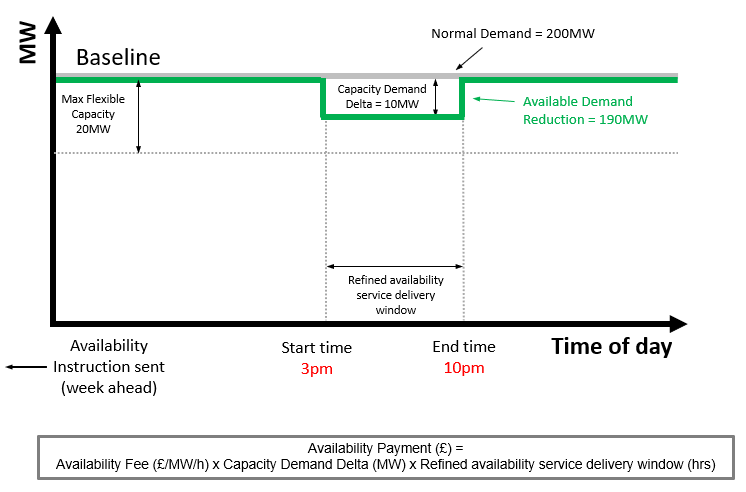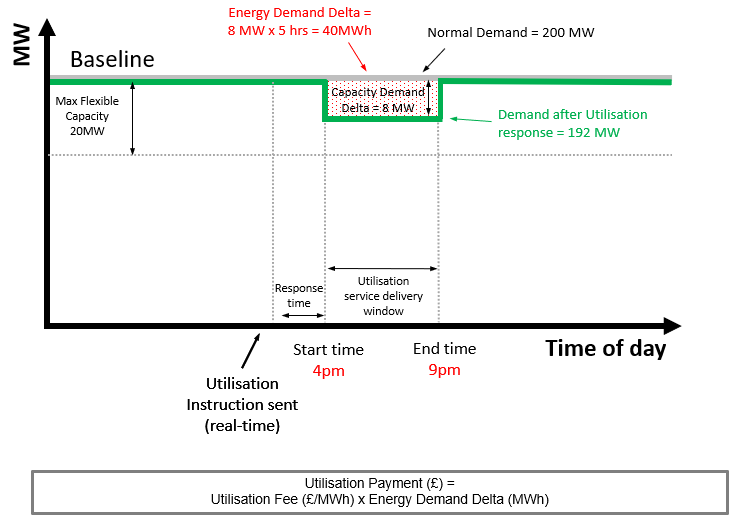Demand reduction
Introduction
A supermarket is looking to provide flexibility services to SP Electricity North West through an Operational Utilisation & Variable Availability contract by reducing its energy usage at peak times.
About flexibility services
When the demand for electricity is greater than the amount that SP Electricity North West can provide, we procure flexibility services to alleviate constraints on our network during peak times. These services are provided by companies or individual customers known as flexibility service providers (FSPs) who own assets in our region such as generators, battery storage and electric vehicle (EV) charge points. FSPs should be able to generate more, or use less, electricity during a pre-agreed service delivery window, and provide at least 10kW of flexibility capacity either individually or via an aggregator. This allows us to balance supply and demand, ensuring a safe and reliable supply of energy for our customers. In return for providing extra capacity, FSPs receive payment from SP Electricity North West.
Delivering an Operational Utilisation & Variable Availability service through demand reduction
The Operational Utilisation & Variable Availability service is a pre-scheduled product that is procured to manage daily demand peaks or post fault response on the network. There are a number of ways the supermarket can reduce its energy consumption to deliver the service during the required window. These include temporarily switching off:

Fridges and freeezers: These account for between 30% and 50% of a supermarket's total electricity consumption. Freezers could be pre-cooled in advance of a service delivery window and then switched off during the service window to reduce electrical demand. Temperature sensors could be used to enable cooling to resume if the fridge/freezer temperature drops below a safe temperature.
Electrical ovens: Scheduling in-store baking to times other than the service delivery window will allow the store to switch off the electric ovens used in the bakery reducing the store's electrical demands during these periods.
EV charge points: The number of EVs on charge or the rate of charging to reduce electrical demand could be controlled either via automated smart charging technology or by manual scheduling. This is likely to be more controllable for the supermarket's fleet vehicles (e.g. delivery vans) and employee EV charging. For example if all the delivery vans are left at the store overnight they can be charged up when there is no flexibility service requirement and are therefore not adding to the store's electrical demand during the delivery period.
Heating and cooling systems: Store heating and cooling systems can be temporarily reduced in output/switched off during the service delivery window to reduce the site's electrical demand. Heat and cold storage technologies could be used to maintain the store's temperature while not increasing its electrical demands. Alternatively, a hybrid heating system such as a combined electrical and gas heat pump system could switch to using gas during the service delivery window.
Pre-tender
Our tenders are published on the ElectronConnect platform twice a year in spring and autumn in line with our Network Development Plan (NDP) and Distribution Future Electricity Scenarios (DFES) publications to reflect our latest network requirements. To be notified of our upcoming tenders, the supermarket signs up to our flexibility mailing list.
Before the launch of the tender, the supermarket:
- Registers the company on ElectronConnect to pre-qualify to participate. The information submitted such as credit checks and insurance details is assessed by SP Electricity North West. Once approved, the company's commercial qualification remains valid for future tender rounds.
- SP Electricity North West utilises the framework style Standard Flexibility Services Agreement developed by the Energy Networks Association Open Networks Project. The supermarket can sign up to the general T&Cs of this agreement as part of commercial qualification, and a signed copy must be returned via Electron before placing a bid.
- Registers its asset(s) on ElectronConnect.
Tender process

Pre-qualification
Once the Invitation to Tender (ITT) has been published, the supermarket reviews the network's flexibility service requirements using the map included in our latest flexibility service requirement. Once it has established that its site is located in a requirement zone seeking an Operational Utilisation & Variable Availability service, it calculates how much of the required demand response it can offer, when and at what price. Before submitting a bid, the supermarket uses the cost calculator tool on our website to check that the prices it is prepared to offer for availability and utilisation don't exceed the ceiling price that we are offering for the service as part of this tender round. The cost calculator can be found in the ITT appendices for our latest flexibility services requirement. At this point, the supermarket decides it would like to participate in the tender.
The next step for the supermarket is to complete technical qualification on ElectronConnect by confirming the assets it wishes to put forward in the competition. SP Electricity North West then assesses the technical details of the assets and their capability for delivery. If the supermarket is unable to provide 10kW of flexible capacity, it can still take part via an aggregator. Aggregators such as electricity suppliers combine load from multiple customers to provide flexibility services; this is explained in more detail in our homeowner case studies on Peak Reduction and Scheduled Utilisation. The supermarket is notified via ElectronConnect that its assets meet the requirements of the tender, allowing it to move to the bidding stage of the process.
Submitting a bid
For the final stage of the procurement process, the supermarket submits a bid to the tender via the ElectronConnect platform. This is carried out by linking the pre-registered assets to the availability and utilisation payments, as well as the periods when the supermarket can respond. Once the bidding window has closed, SP Electricity North West assesses the tender responses before accepting or rejecting bids based on the proposed payment and the asset's ability to meet the specification. If the supermarkets's bids are successful they will then enter into a flexibility services agreement with SP Electricity North West to deliver the service within the required service windows.
Helpful tips to consider before submitting a bid
- Prices should be made up of an availability payment and a utilisation payment. Availability is the price paid to the provider even if SP Electricity North West does not call on the flexibility service. Utilisation is the price paid to the provider for the level of response it has actually provided on request. Note: SP Electricity North West will not always utilise as much energy as it has requested; there is a level of over-procurement built in to ensure a sufficient response is available if required.
- When calculating the tender bid prices the provider should consider the cost of lost revenue, fuel costs, environmental or permit fees, initial set-up costs, maintenance, other revenue streams available, energy savings benefits etc.
- When thinking about availability periods the provider should consider the practicalities of these periods, the processes required to ensure that the service can be delivered, seasonal considerations e.g. major televised events, Christmas period, weather-related issues e.g. extreme cold weather increasing heating demand and maintenance periods.
Flexibility service products
SP Electricity North West procures four common products (services), which align with the Open Networks service definitions:
- Peak Reduction
- Scheduled Utilisation
- Operational Utilisation
- Operational Utilisation & Variable Availability.

The Operational Utilisation and Variable Availability product is used to keep the power flowing during an unplanned network event during maintenance work or network thermal constraints.
The supermarket ensures it is available to deliver the demand reduction response during the service windows specified in its bid response.
Dispatch
The supermarket can choose to receive dispatch instructions via application programming interface (API), email or our remote terminal units (RTUs).
Worked example
The supermarket has an installed capacity of 100MW and can reduce its demand by up to 20MW during certain pre-determined time periods. In this example, the pre-determined period is November-February every Monday-Friday between 12am-5am and 3pm-12am. The supermarket can respond to requests for demand reduction within ten minutes. The restoration time after responding to electricity demand reductions is one hour.
Availability dispatch
It is assumed there is a network constraint in December. On Thursday, we will ask the supermarket to be available to reduce its demand by up to 10MW the following week on Wednesday between 3pm-10pm*. The supermarket is expected to be ready to respond within ten minutes of receiving our dispatch signal. Availability fees will be paid to the supermarket to remain in a state of readiness to respond immediately to a utilisation instruction during the service window (i.e. on Wednesday between 3pm-10pm), even if the reduction is not requested. In this example, the supermarket will be paid for 10MW of availability over seven hours.
Example: the supermarket responds to an availability instruction for demand reduction

Utilisation dispatch
If we send a dispatch request in real-time to the supermarket asking to reduce its demand on Wednesday by 8MW between 4pm-9pm**, then it will receive an additional utilisation payment. The supermarket will be paid for the reduced energy in MWh in its demand profile between 4pm-9pm compared to its expected energy demands (based on its historical demand profiles).
* The DNO can refine a week ahead the volume of availability required (i.e. 15 MW instead of 20MW) and the availability windows required (days and hours) (i.e. Wednesday instead of Monday-Friday and 3pm-10pm instead of 12am-5am and 5pm-12am).
**The DNO can instruct/use a portion of the available volume (i.e. 8kW instead of 15MW) and only for a portion of the refined available time window (4pm-9pm instead of 3pm-10pm).
Example: the supermarket responds to a utilisation instruction for demand reduction

Baselining
A baseline is a reference used to measure the amount of flexible capacity delivered to the network by FSPs. There are different kinds of baselining methodologies used depending on the type of asset and service being provided. These include historical baselines (using past meter readings to estimate the baseline using standard algorithms) and nominated baselines (using other forecasting techniques such as weather-based models to estimate the future baseline). The baselining methodology will be agreed between SP Electricity North West and the supermarket post contract award and at least six months before the first utilisation period. More information on the different types of baselining methodologies can be found on our FAQs page.
Invoicing
Subject to the delivery of flexibility services, the supermarket will invoice SP Electricity North West and receive payment by bulk electronic clearing (BACS) by the end of the following month (after the invoice is received).
Useful links
Register for updates
Sign up to our flexibility services mailing list to find out about new requirements and receive invites to our events.
Get in touch
If you would like to leave feedback, book a meeting with a member of our team or if you have any questions about flexibility services, please get in touch.